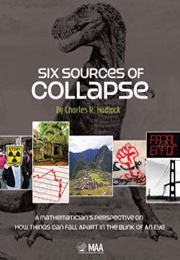 Six Sources of Collapse
Six Sources of Collapse Book contents
- Frontmatter
- Preface
- Acknowledgements
- Contents
- 1 Introduction
- 2 Predicting Unpredictable Events
- 3 Group Behavior: Crowds, Herds, and Video Games
- 4 Evolution and Collapse: Game Playing in a Changing World
- 5 Instability, Oscillation, and Feedback
- 6 Nonlinearity: Invitation to Chaos and Catastrophe
- 7 It's All About Networks
- 8 Putting It All Together: Looking at Collapse Phenomena in “6-D”
- References
- Index
- About the Author
2 - Predicting Unpredictable Events
- Frontmatter
- Preface
- Acknowledgements
- Contents
- 1 Introduction
- 2 Predicting Unpredictable Events
- 3 Group Behavior: Crowds, Herds, and Video Games
- 4 Evolution and Collapse: Game Playing in a Changing World
- 5 Instability, Oscillation, and Feedback
- 6 Nonlinearity: Invitation to Chaos and Catastrophe
- 7 It's All About Networks
- 8 Putting It All Together: Looking at Collapse Phenomena in “6-D”
- References
- Index
- About the Author
Summary
Like a thief in the night?
If your house has ever been burglarized, as has mine, I'm sure you share with me the recollection of surprise and shock, along with other emotions like anger or sadness. But if you read in the newspaper about a burglary in another town, you're likely to shrug your shoulders and think, well, there are lots of burglaries all the time. So here we have this occurrence, a burglary, which is quite common, but the trigger that raises our eyebrows is when it occurs to us. The dynamics that control whether it occurs to us in particular may be sufficiently vague that we characterize it as a totally random event, or they may be more specific if we can relate the burglary to our own individual circumstances, such as leaving the house unlocked, hiring lots of occasional workers, displaying wealth, etc. In this latter case, these dynamics may well admit a deeper level of understanding.
I don't know when the next really big earthquake is going to occur along the San Andreas fault, but when it does, it's going to shock a lot of people. And yet, we all know that over time, earthquakes along this fault are quite frequent and occur with some regularity. I also know that the next really large earthquake to hit the Boston area, where I live, is going to catch even more people by surprise, even though geologists tell us that we have had big ones in the past (e.g., the Cape Ann Earthquake of 1755) and we will definitely have them in the future [114].
- Type
- Chapter
- Information
- Six Sources of CollapseA Mathematician's Perspective on How Things Can Fall Apart in the Blink of an Eye, pp. 15 - 40Publisher: Mathematical Association of AmericaPrint publication year: 2012


